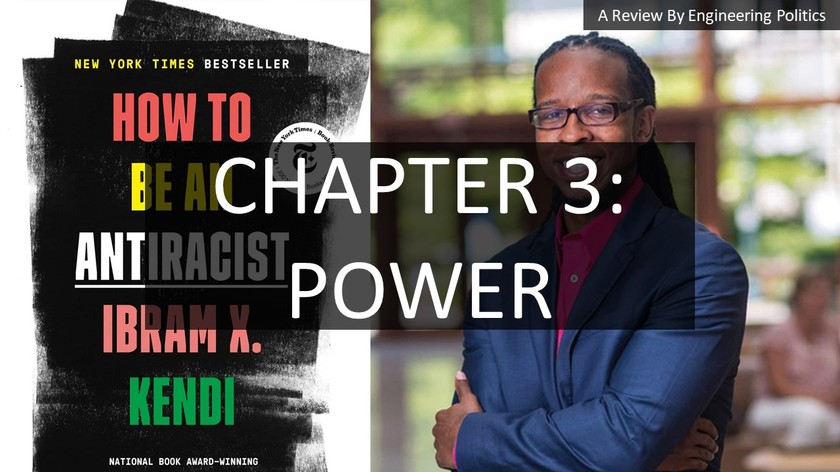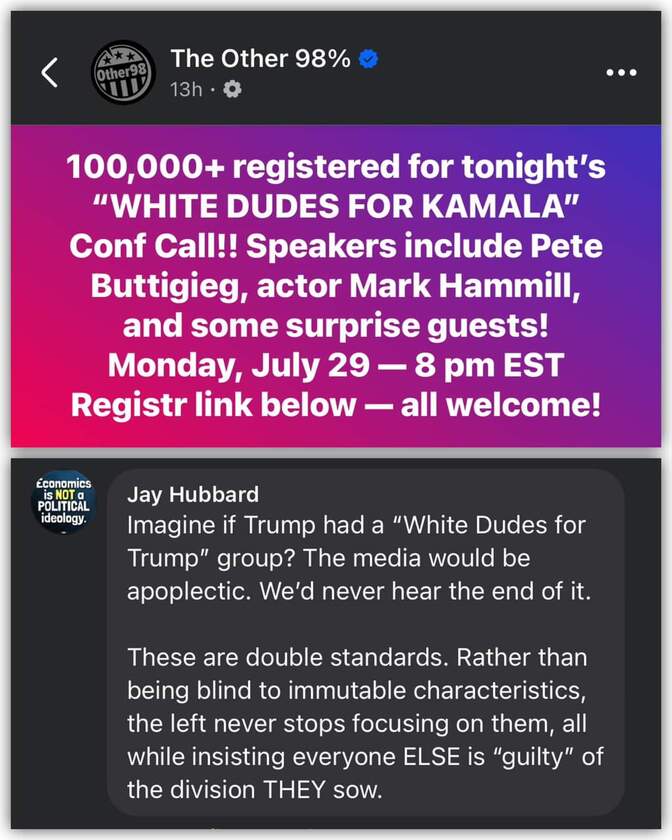
We having fun yet? This chapter goes over what Kendi calls racial power. Kendi follows the same logic many other critical theorists follow; everything is about power and the pursuit of power. Shocker. Kendi starts out by defining the word Race.
“RACE: A power construct of collected or merged difference that lives socially.”
Race is a concept that will be further explained later in the chapter. The word itself does have foundations in racism and slavery, but it is very clear it does not carry the same context today. Most people use race as a synonym for ethnicity. Race, as we define it now, has nothing to do with power or power structures. It’s a collection of individuals who share similar genetics, which is why you can take a test to see your genetic markup, and can also share traditions, although the genetic component does not directly tie race to tradition or culture. If we disassociate race and power, as we should today, this chapter falls apart (along with most of the book). But to entertain ourselves, and mostly to motivate myself to read the rest of this book, let’s take in Kendi’s base assumption. This next quote comes during his experience as a seven year old kid visiting a new school when he notices a mostly black school has only one black teacher.
“In that classroom, on that April day in 1990, my parents discovered that I have entered racial puberty. At seven years old, I began to feel the encroaching fog of racism overtaking my dark body. It felt big, bigger than me, bigger than my parents or anything in my world, and threatening. What a powerful construction race is – powerful enough to consume us. And it comes for us early”
“What a powerful construction race is – powerful enough to consume us.” You think? This is a “can’t see the forest through the trees” situation. The construction of race has consumed Kendi and is making him act irrationally, except he doesn’t notice, or at least care enough to understand the effects. I don’t fault a seven year old Kendi for thinking this way. He’s just a kid. I’m sure this isn’t uncommon in spaces where we see self-segregation along with disparate outcomes, but the last thing we should do is discourage assimilation, since we can assimilate course curriculum and educational techniques to dampen or eliminate these disparities, and we should not be making every inequity some sort of imbalance of power. Racial puberty should be considered a nonsensical term, not some sort of self-actualizing achievement.
“Some White people do not identify as White for the same reason they identify as non-racist: to avoid reckoning with the ways that Whiteness – even as a construction and mirage – has informed their notions of America and identity and offered them privilege, the primary one being the privilege of being inherently normal, standard, and legal. It is a racial crime to be yourself if you are not White in America. It is a racial crime to look like yourself or empower yourself if you are not White. I guess I became a criminal at seven years old.”
Let’s set the cringe worthy, self-aggrandizing final sentence in this paragraph aside and look at what Kendi is trying to say. White people tend to not identify as white for two main reasons: (1) white is not an interesting characteristic when compared to ethnicity, and (2) identifying as white has had a well-deserved turbulent history. I don’t identify as white because I find it’s more interesting to identify as German/Swiss/Polish (as an example since I only identify as Merican). The second reason gets into a bit of what Kendi is talking about but is not as sinister. I’m fine with being described as white, but I’m not going to make it an identity that I derive power from. I plain and simply don’t think the color of my skin ought to change my world view. The privilege Kendi eludes to is the kind of complaint you hear when someone points out Band-Aids only come in one color. Kendi implies that I may have never even noticed this is true, considering it was the standard, but jokes on him, I still only use the Spiderman Band-Aids, even though I don’t identify as Spiderman. There is certainly some validity in his claim. When you have a majority and a minority, it makes sense to cater your products to the largest consumer base. But because this results in some sort of inequity of what is considered standard, even though the intentions aren’t racist, the act is still considered racist when we redefine the word. We must throw out all standards.
At the end of the chapter, Kendi goes into the history of slavery, the slave trade, and the origins of the word race. Through my sort research, it seems like many of Kendi’s historical claims are true, but like most critical theorists, he uses the context of past actions to explain the context of different actions today.
“[T]o create hierarchy, the first racist idea.”
It isn’t totally clear to me what Kendi’s meaning behind this statement is. If he is referring to an explicitly racist hierarchy, such as slavery, then he is 100% correct. But we know the word hierarchy is used as a pejorative with many progressives, so reading this quote as all hierarchies are bad or racist isn’t a stretch. If that’s the case, then this is another clear conflation Kendi makes to connect a universal human behavior, like creating hierarchies, to some sort of racist inequity. This is a harmful idea that not only destroys the main objectives of many useful hierarchies, such as competence, but will lead to a hierarchy flip that will result in a rigid, corrupt hierarchy based on oppression points and cancel culture. You can listen to my discussion with @ReturnToReason on the Engineering Politics Podcast (#16) for an in-depth elaboration on hierarchies and what I call hierarchical inversion.
“I had been taught that racist ideas cause racist policies. That ignorance and hate cause racist ideas. That the root problem of racism is ignorance and hate. But that gets the chain of events exactly wrong. The root of the problem – from Prince Henry to President Trump – has always been self-interest of racist power. Powerful economic, political, and culturally self-interest… has been behind racist policies.”
The first three lines Kendi writes are exactly true. Racism is bred from ignorance. But then he reverses direction. He links historical figures, like Prince Henry (nicknamed the Navigator) of Portugal, to present-day figures like President Trump. This creates a bridge that allows us to call people racist without the need of compelling evidence. Kendi also creates this bridge to link racism to economics, politics, and culture. He effectively makes the claim racism is not bred from ignorance but derived from the overwhelming interest in racist power. As to why racist power is more desirable than just regular power is unknown to me, but it makes for a more interesting narrative I guess. Kendi writes several pages on the history of the slave trade to make this point, and I won’t cite all the details here, but there is not much evidence slavery is driven by racism at all. Actually, as Thomas Sowell points out in Black Rednecks and White Liberals, slavery has been around well before different races traveled far enough to interact with each other. This would imply the relationship between slavery and racism is influenced in the other direction. Racism is used to justify slavery rather than racism causing slavery. At the very end of the chapter, Kendi also makes the claim racist policies caused inequities that were then blamed on those same people rather than the policies, which was true, but as I explained in previous chapter reviews, as long as those policies have been eliminated, individual agency must take over to better the individual’s circumstances. We should acknowledge all the externalities of past racist injustices, but we can’t use past discrimination to validate present discrimination. Kendi explicitly disagrees.
Thanks for reading my rant style review of the third chapter of How to be an Antiracist by Ibram X. Kendi. Please let me know if you find this useful. My goal here is to explain each chapter enough and in a somewhat objective way so others don’t waste their time and money on investigating this material themselves. I know this kind of goes against the logic of investigation where you want to read the source material yourself and build your own conclusions, but this is a very shallow read that does not strain the mind, in any positive way at least, like any proper academic book should. Please leave a comment with your thoughts.
Thanks for being a part of the Engineering Politics Locals Community!

I was listening to some news updates when I heard this CNN clip about the potentially hazardous water in East Palestine, and as soon as I heard her ask the question about whether or not her guest would drink the water, I IMMEDIATELY thought of this clip from South Park. Enjoy.
In this special episode of The Engineering Politics Podcast, Truman from Return To Reason is back for a new video and podcast series titled ‘Revisiting The Road To Serfdom’ where we review F.A. Hayek’s classic work, The Road To Serfdom. This episode covers ‘Chapter 15: The Prospects of International Order’.
This will be an ongoing series that covers the entire book. We put a ton of work into making this insightful and relevant, so we hope you enjoy watching/listening as much as we enjoyed reading and recording.
Become a subscriber of the Engineering Politics Locals Community to support this content. Also, consider joining the @ReturnToReason Locals Community to show Truman some support.
In this episode of The Engineering Politics Podcast, I team up with Truman from @ReturnToReason to interview one of the most intelligent and influential creators in the space of philosophy today. Stephen R.C. Hicks is a Professor of Philosophy at Rockford University, Executive Director of the Center for Ethics and Entrepreneurship, and Senior Scholar at The Atlas Society. He has written many books including Explaining Postmodernism and Nietzsche and the Nazis. We bring him on to talk about the social and political issues we are currently facing in America, and the West more broadly, and what the collectivist ideas of Jean-Jacques Rousseau might have to do with it.
Become a subscriber of the Engineering Politics Locals Community to support this content. Also, consider joining the @ReturnToReason Locals Community to show Truman some support.
In this special episode of The Engineering Politics Podcast, Truman from Return To Reason is back for a new video and podcast series titled ‘Revisiting The Road To Serfdom’ where we review F.A. Hayek’s classic work, The Road To Serfdom. This episode covers ‘Chapter 15: The Prospects of International Order’.
This will be an ongoing series that covers the entire book. We put a ton of work into making this insightful and relevant, so we hope you enjoy watching/listening as much as we enjoyed reading and recording.
Become a subscriber of the Engineering Politics Locals Community to support this content. Also, consider joining the @ReturnToReason Locals Community to show Truman some support.
In this episode of The Engineering Politics Podcast, I team up with Truman from @ReturnToReason to interview one of the most intelligent and influential creators in the space of philosophy today. Stephen R.C. Hicks is a Professor of Philosophy at Rockford University, Executive Director of the Center for Ethics and Entrepreneurship, and Senior Scholar at The Atlas Society. He has written many books including Explaining Postmodernism and Nietzsche and the Nazis. We bring him on to talk about the social and political issues we are currently facing in America, and the West more broadly, and what the collectivist ideas of Jean-Jacques Rousseau might have to do with it.
Become a subscriber of the Engineering Politics Locals Community to support this content. Also, consider joining the @ReturnToReason Locals Community to show Truman some support.
In this special episode of The Engineering Politics Podcast, Truman from @ReturnToReason is back for a new video and podcast series titled ‘Revisiting The Road To Serfdom’ where we review F.A. Hayek’s classic work, The Road To Serfdom. This episode covers ‘Chapter 14: Material Conditions and Ideal Ends’.
This will be an ongoing series that covers the entire book. We put a ton of work into making this insightful and relevant, so we hope you enjoy watching/listening as much as we enjoyed reading and recording.
Become a subscriber of the Engineering Politics Locals Community to support this content. Also, consider joining the @ReturnToReason Locals Community to show Truman some support.














